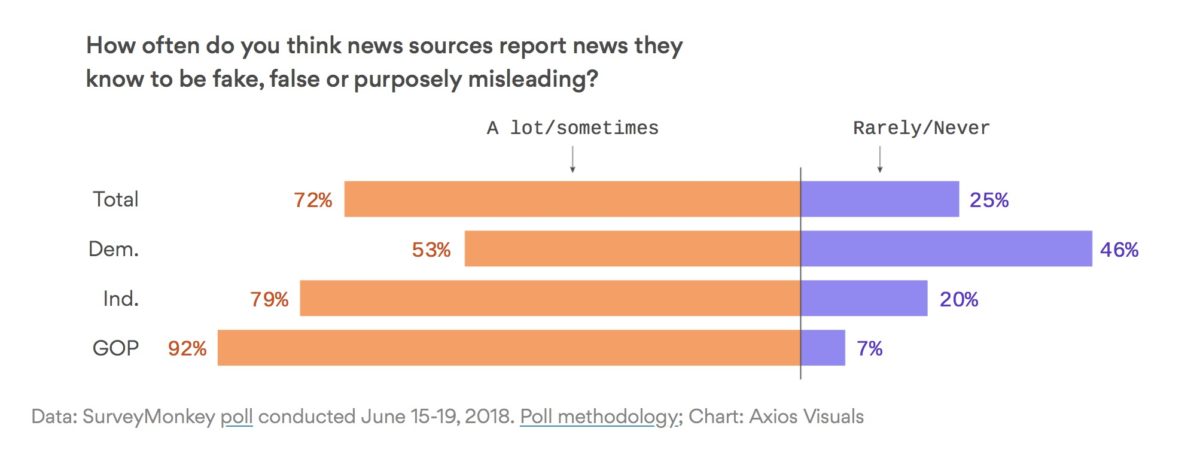
If you appreciate my work and want to contribute to independent media, consider becoming a monthly Patron, or visit the Support Page.
Top Links
72% Think Traditional Media Reports Fake News (Axios)
California Has 48 Hours to Pass This Privacy Bill or Else (Important article on the tool of direct democracy/referendums, Gizmodo)
Pro-Trump Conspiracy-Monger “QAnon” Calls for Regime Change in Iran (QAnon is one of the most idiotic things I’ve ever encountered, MintPress News)
Meet Alexandria Ocasio-Cortez, the Millennial, Socialist Political Novice Who Beat Her Establishment Democratic Rival in a Huge Electoral Upset (Business Insider)
The Coming Collapse (Chris Hedges, TruthDig)
U.S., Ecuador Coordinating About Future Of Assange Asylum (Caitlin Johnstone, Medium)
BOJ Is Now A Top-10 Shareholder In 40% Of All Japanese Companies; Owns 42% Of All Government Bonds (And they tell us Bitcoin is the absurdity, Zerohedge)
Head of Prominent Charity That Campaigns Against Child Abuse Is Arrested for ‘Trying to Arrange to Rape Multiple Children as Young as Two’ (Typical, The Daily Mail)
The Beginning Of The End Of The Bilderberg Era (Very good read of the geopolitical situation, The Strategic Culture Foundation)
The Remaking of Class (The New Republic)
How My Unschooled Child Learned to Read Financial Statements (FEE)
U.S. Politics/News
Steve Schmidt Attacks Alexandria Ocasio-Cortez for ‘Dishonest Progressivism’ — and Says It’s Bad as ‘Trumpism’ (These hacks are so clueless, Raw Story)
Nancy Pelosi Says Socialism Is Not Ascendant in Democratic Party (CBS News)
Trump Administration to Use Review Panel to Curb China Tech Investments (Reuters)
Public Bank That Would Boost Pot Shops, Affordable Housing Could Go Before L.A. Voters This Fall (Very interesting, LA Times)
4 Takeaways From Tuesday’s Primary Elections (The New York Times)
Comparing Alexandria Ocasio-Cortez to Trump Is Absurd (Matt Taibbi, RollingStone)
As Critics Assail Trump, His Supporters Dig In Deeper (The New York Times)
Mueller Obtains Erik Prince’s Communications (The Hill)
Judicial Watch Obtains IRS Documents Revealing McCain’s Subcommittee Staff Director Urged IRS to Engage in “Financially Ruinous” Targeting (Judicial Watch)
International News/WW3
France’s Macron Brings Back National Service (Creepy, BBC)
EU Leaders to Strengthen Defenses, Seek ‘Strategic Autonomy’ at Summit (Reuters)
U.S. Lawmaker Holds Back Support for Munitions Sale to Gulf Allies Due to Yemen (Reuters)
Passing of Draconian Laws Throws Australian Rights and Freedoms Under the Bus (Amnesty International)
Iran’s Top Leader Says Harm to Economy Must Be Punished (Reuters)
The Iranian Regime Is in Trouble (Terrible title but good article, Haaretz)
Finance/Economy/Crypto
What’s the Yield Curve? ‘A Powerful Signal of Recessions’ Has Wall Street’s Attention (The New York Times)
Amazon Makes $1 Billion Splash in Health Care, Buying PillPack (Bezos wants to dominate all aspects of human life, Bloomberg)
Amazon Wants to Foster Small Independent Delivery Fleets (Reuters)
Boeing Unveils Hypersonic Airliner Concept (Aviation Week)
Alibaba’s Jack Ma Says Bitcoin Is ‘Likely’ a Bubble While Embracing Its Underlying Blockchain Tech (Billionaires hate Bitcoin, CNBC)
Facebook Lifts Cryptocurrency Ban Amid Rumours of Coinbase Bitcoin Exchange Takeover (The Independent)
Liberty Blitzkrieg Partners
Open the Books (Every Dime. Online. In Real Time)
In Liberty,
Michael Krieger
Donate bitcoins: 35DBUbbAQHTqbDaAc5mAaN6BqwA2AxuE7G
Follow me on Twitter.





How Big Pharma Was Captured by the One Percent
The industry’s price-gouging economic model was engineered by Wall Street and its political enablers—and only Washington can fix it.
By Alexander Zaitchik
June 28, 2018
Donald Trump’s plan to lower prescription drug prices, announced May 11 in the Rose Garden, is a wonky departure for the president. In his approach to other signature campaign pledges, Trump has selected blunt-force tools: concrete walls, trade wars, ICE raids. His turn to pharmaceuticals finds him wading into the outer weeds of the 340B Discount program. These reforms crack the door on an overdue debate, but they are so incremental that nobody could confuse them with the populist assault on the industry promised by Trump the candidate, who once said big pharma was “getting away with murder.”
With his May 11 plan, Trump is, in effect, leaving the current pharmaceutical system in place. Increasingly, its most powerful shareholders are the activist managers of the hedge funds and private equity groups that own major stakes in America’s drug companies. They hire doctors to scour the federal research landscape for promising inventions, invest in the companies that own the monopoly licenses to those inventions, squeeze every drop of profit out of them, and repeat. If they get a little carried away and a “price gouging” scandal erupts amid howls of public pain and outrage, they put a CEO on Capitol Hill to endure a day of public villainy and explain that high drug prices are the sometimes-unfortunate cost of innovation. As Martin Shkreli told critics in 2015 of his decision to raise the price of a lifesaving drug by 5,000 percent, “this is a capitalist society, a capitalist system and capitalist rules.” That narrative, that America’s drug economy represents a complicated but beneficent market system at work, is so ingrained it is usually stated as fact, even in the media. As a Vox reporter noted in a piece covering the May announcement of Trump’s plan, “Medicine is a business. That’s capitalism. And we have seen remarkable advances in science under the system we have.”
This is a convenient story for the pharmaceutical giants, who can claim that any assault on their profit margins is an assault on the free market system itself, the source, in their minds, of all innovation. But this story is largely false. It owes much to the rise of neoliberal ideas in the 1970s and to decades of concerted industry propaganda in the years since.
In truth, the pharmaceutical industry in the United States is largely socialized, especially upstream in the drug development process, when basic research cuts the first pathways to medical breakthroughs. Of the 210 medicines approved for market by the FDA between 2010 and 2016, every one originated in research conducted in government laboratories or in university labs funded in large part by the National Institutes of Health. Since 1938, the government has spent more than $1 trillion on biomedical research, and at least since the 1980s, a growing proportion of the primary beneficiaries have been industry executives and major shareholders. Between 2006 and 2015, these two groups received 99 percent of the profits, totaling more than $500 billion, generated by 18 of the largest drug companies. This is not a “business” functioning in some imaginary free market. It’s a system built by and for Wall Street, resting on a foundation of $33 billion in annual taxpayer-funded research.
Generations of lawmakers from both parties bear responsibility for allowing the drug economy to become a racket controlled by hedge funds and the Martin Shkrelis of the smaller firms. The current crisis in drug prices and access—as well as a quieter but no less serious crisis in drug innovation—is the result of decades of regulatory dereliction and corporate capture. History shows there is nothing inevitable or natural about these crises. Just as the current disaster was made in Washington, it can be unmade in Washington, and rather quickly, simply by enforcing the existing U.S. Code on patents, government science, and the public interest.
“The law restricts the use of exclusive licenses on inventions performed in a government laboratory and owned by the government,” said Jamie Love, the director of Knowledge Ecology International, a D.C.-based nonprofit organization that works on access to affordable medicines and related intellectual property issues. “Before an exclusive license is even offered, the government must ask: Is the monopoly necessary? Whether an invention is done at the NIH or UCLA, there is also an obligation to ensure the drug is available to the public on reasonable terms.”
Of course, a long run of NIH administrators, answering to a long run of Secretaries of Health and Human Services, have chosen to ignore these requirements. “The NIH refuses to enforce the apparatus because it wants the pipeline,” Barnett said.
“The lack of political will suggests the industry has bought everyone off.”
https://newrepublic.com/article/149438/big-pharma-captured-one-percent
The GOP respondents in that poll are closest to the truth, but they probably don’t realize that Fox and talk radio are part of the fake news mechanism too.